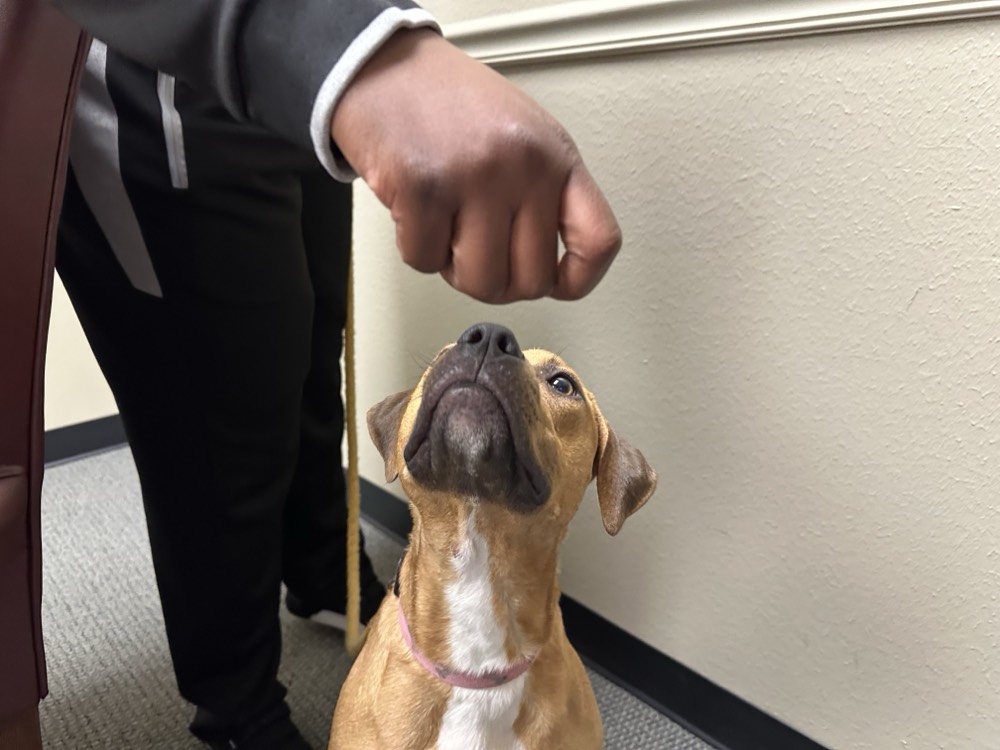Fort Bend County program partners kids in juvenile detention with shelter dogs – Houston Public Media


At the Fort Bend County Juvenile Detention Center, a kennel sits on the edge of the facility.
It houses five dogs from the county's animal shelter – all of which are trained by young people being held at the detention center.
The Canine Leadership Program, which is run by the county's juvenile probation department, was developed in 2011. The program's leaders say it allows those at the juvenile detention center southwest of Houston — kids ages 10-17 who have been charged with criminal offenses — to learn new skills while also helping shelter dogs become more adoptable.
“We’ve got a lot of kids that come in that are scared of dogs,” said Camarah Brown, the canine coordinator for the program. “They’ve been bitten before, been chased, and they come in the program and they’re totally nervous. But then they learn how to just communicate with a dog.”
About 15 juveniles are involved in the formal 10-week curriculum developed by Brown, but the program's leaders also bring the dogs inside the detention facility to work with kids who aren't eligible for the class. In total, the program's leaders estimate that about 75 kids currently work with the dogs – whether through the class or more informal training.
Houston Public Media is not naming any of the program participants because they're minors who are being held at the juvenile detention center. Once these juveniles turn 19, they may be eligible to have their records sealed. The county’s juvenile probation department can help seal their records if they do not have a felony adjudication and if they have not committed a Class B misdemeanor or more serious offense. Those who do not qualify for this assistance can apply on their own to have their records sealed.
Natalie Weber/Houston Public Media
A 17-year-old girl at the detention center said she enjoys all aspects of the class – even cleaning up after the dogs.
“It means being able to take some dogs from a bad situation and help them build from it – like, teach them new skills and try and get them to be healthy and just to find a better home,” she said. “And I think it also helps us to learn more about dogs and how to take care of them.”
The program’s curriculum goes over basic commands, dog behaviors and how to read their body language. It also helps the kids develop soft skills, touching on themes like compassion and empathy.
“They learn responsibility,” Brown said. “They learn problem solving – they learn how to communicate with each other.”
Aurora Peña, the program's canine leadership assistant, described the program as a form of “canine therapy” for the kids who are involved.
Natalie Weber/Houston Public Media
“Sometimes the kids want to just pet the dog,” she said. “It’s a really good stress reliever. It lowers the cortisol levels and it boosts oxytocin.”
A 15-year-old boy who's taking the 10-week class said he was afraid of dogs before he joined the program. Now, he'd like to adopt one of his own.
“The dogs show me that they’re not aggressive,” the 15-year-old said. “They play a lot, but they know when to be chill.”
The program costs about $105,000 per year for the county to run, including personnel costs and operating supplies. Fort Bend Partnership for Youth, a nonprofit that supports the county's juvenile probation department, covers the costs of supplies that aren't funded by the county.
Susan Bearden, who runs Fort Bend Partnership for Youth and is the supervisor of special programs for the probation department, said community members can get involved by volunteering as mentors with the probation department or giving a donation to the nonprofit for the canine program.
Recent Posts
Home life better for cats and wildlife under new SHRCC rules
Home life better for cats and wildlife under new SHRCC rules af72c1e7d666be7a612510e8a6f41378 Sunraysia…
Lucy the poochie dog and little guardian, a rescue love story
We think we are saving them, but they are saving us. Grice Connect's Michele LeBlanc…
‘Black magic’ horror in Bengaluru: Woman slits pet dog’s throat, hides body at home
A woman hailing from West Bengal has allegedly killed one of her pet Labradors as…
New Orleans vet warns pet owners of rising heat stroke cases
Learn which pets are most at risk, warning signs to watch for, and when to…
Boston Dynamics Dog Rushed to Vet After Getting Into a Bag of Unattended Flash Drives
BOSTON — A serious medical emergency occurred this past weekend after a Boston Dynamics robotic…
Bengaluru Woman Booked For Killing Pet Dog On Pretext Of Black Magic
Bengaluru: The Karnataka Police have filed an FIR against a young woman from West Bengal…

